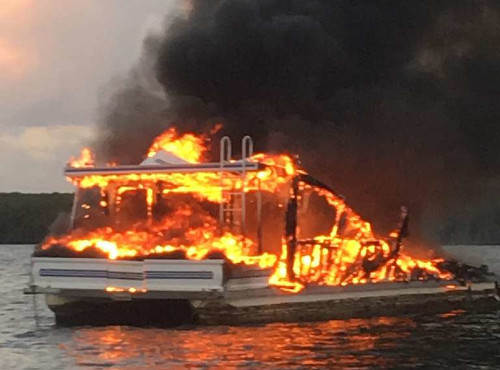Last time we examined what you need to consider before, and while, abandoning ship. It was noted that one of the two main reasons to abandon ship was a fire. In order to truly understand why it is so important to always be prepared to abandon ship, it’s worth looking at boat fires in more detail.
The BoatUS Marine Insurance company has kept an exhaustive list of claims data and has found that the most common causes of fire on boats in descending order are:
- AC and DC electrical faults
- Engine or exhaust heat
- Situations involving fuel
By looking at the layout of your boat, this list can give you an idea of all the places that a fire may start. You may also discover that there are very few areas on your boat that are completely free of risk and many of these areas are hard to observe.
If you see (or smell) an indicator of a fire, which is most likely smoke, you should do the following:
- Raise the alarm. Firstly, make everyone else onboard aware of the fire and if possible, someone should transmit a Mayday call.
- If practical, manoeuvre the vessel so the fire is downwind to remove smoke and heat from the vessel.
- If the burning object can be safely thrown overboard, do so as quickly as possible.
- If the fire is in an enclosed space, close windows and doors to reduce oxygen available to the fire.
- Shut off all fuel lines, particularly if the fuel lines are leading past or to the location of the fire.
- Attack the fire with whatever fire fighting equipment you have on board. For most recreational boats this is likely to be a combination of fire extinguishers and buckets.
- If you manage to stop the fire, maintain a watch to ensure it does not reignite.
It is important to remember that each fire extinguisher is going to have a useful life of one minute or less. That means if you are carrying one fire extinguisher you are going to have at most one minute to put the fire out completely. If the fire is still burning after you have exhausted your fire extinguisher/s you will have no choice but to abandon ship.
At this point the decision to abandon ship may have to be made very quickly. The BoatUS Foundation conducted tests on a variety of boats by setting them on fire. The largest boat was a 25-foot power cruiser. Within three minutes of a fire starting on this boat, the smoke was so dense that anyone left on the boat would be asphyxiated. Within four minutes of the fire starting, the entire boat was completely engulfed in flames.
Using this data, we can estimate that from the moment you first see or smell smoke, you have less than four minutes to locate and attempt to fight the fire, make a mayday call and follow the procedures we talked about previously to abandon ship. If we break that down further; if it takes you one minute to notice the fire, position your boat to put the fire down wind and begin using your fire extinguisher, and you then use your fire extinguisher for a further minute, this means that you may have 60 seconds or less to make a mayday call and abandon ship with everything you will need to survive in the ocean before you risk succumbing to smoke inhalation. This emphasises the importance of always having a solid plan to abandon ship in place.
If you have any questions about boat fires, or anything else related to your boat, you can always contact Volunteer Marine Rescue Gladstone

